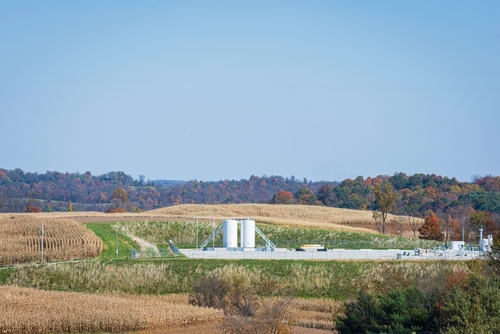
Proposals in the state to increase setback distances would amount to a ban on natural gas development in Pennsylvania, according to the Marcellus Shale Coalition (MSC), an industry trade group.
The coalition says that natural gas development in Pennsylvania is already being done responsibly thanks to the state’s stringent regulatory framework, which enables safe development in communities across the commonwealth.
“Increasing setbacks is a misguided policy that threatens our national security and prosperity while impeding the property rights of Pennsylvania citizens,” said Marcellus Shale Coalition President Dave Callahan. “Let’s get the facts straight. There is no scientific reasoning behind a 2,500-foot setback.”
Most recently, however, the Board of Supervisors in Cecil Township, Pa., on Nov. 4 approved a revision to its oil and gas ordinance that increases the distance new well pads must be from homes, businesses, schools, and hospitals.
Now, any new well pads must be roughly 2,500 feet (a little less than a half-mile) from homes and businesses, and 5,000 feet (around a mile) from hospitals and schools, according to the revised ordinance. The previous ordinance placed well pads within 500 feet of most structures in line with a statewide standard.
“Cecil Township’s recent decision to impose a 2,500-foot setback from residential properties and a staggering 5,000-foot setback from schools and hospitals under the guise of “safety” amounts to an outright ban on future natural gas development in the township,” MSC wrote in a Nov. 5 blog.
“This decision isn’t grounded in science or public safety; rather, it’s a purely political move aiming to shut down an industry crucial to Pennsylvania’s economy, our nation’s energy security and, critically, our ability to continue driving environmental progress,” said MSC.
The coalition also pointed out that the township’s newly enacted revision mirrors “dangerous legislative proposals” that have drawn bipartisan criticism from policymakers who were concerned about the impacts to future natural gas development in Pennsylvania.
For example, PA Senate Bill 650 and House Bill 1465, introduced during the 2021-2022 legislative session, would increase existing setbacks and impose new setback distances: from 500 feet to 2,500 feet for an existing water well or building; from 1,000 feet to 2,500 feet for a public drinking water supply intake, except a reservoir; from 1,000 feet to 5,000 feet for a reservoir; and 5,000 feet from a school or hospital, according to a whitepaper analysis by MSC.
The whitepaper found that proposed setback distances would prohibit the construction and development of unconventional natural gas in 99 percent of Allegheny, Beaver, Butler, and Washington counties, while less than 1.5 percent of developable land in Lycoming County would be available for development under the legislation.
“The proposed setback distances within SB 650 and HB 1465 would prohibit the siting and development of unconventional natural gas wells in an overwhelming majority of the commonwealth where unconventional natural gas is currently being produced safely and responsibly,” the MSC whitepaper says. “This shortsighted approach will deprive tens of thousands of property owners who own oil and gas rights from realizing the financial benefit of their own property, is not justified or supported by any scientific or health data, and would threaten energy production and therefore national security in the United States.”
MSC also says that natural gas development is fundamental to the health and strength of Pennsylvania’s economy, supporting well over 100,000 family sustaining careers, boosting state tax revenues, and generating billions in economic benefits.
In fact, an August 2023 economic impact report on shale gas development found that the industry supported 123,000 jobs, with an average wage of about $97,000 a year. That’s 113 percent higher than the average median wage in the state and part of the over $12 billion provided in labor income, according to the report, which MSC commissioned.
The industry also contributed more than $41 billion in economic activity that boosted the state’s gross domestic product (GDP) by nearly $25 billion, and generated $3.2 billion in state and local tax revenues, $279 million of which supported the Impact Fee that is distributed to communities in all 67 Pennsylvania counties, as well as various environmental and conservation programs, the report says.
“Looking ahead, the industry’s impact on Pennsylvania’s economy is forecast to be robust for decades to come,” says the report.
MSC in its whitepaper outlines the impacts of a natural gas development ban, saying increased setback distances are meant to prohibit further natural gas development and deprive property owners of their oil and gas rights.
The consequences of doing so would be costly, says MSC, and include declining domestic energy production, increased electricity costs to consumers, decreased reliability of the energy grid, increased reliance on foreign dictatorships, and increased threats to energy and national security.
Other consequences would include “a precipitous decline” in tax revenues collected from the industry, including Impact Fee revenue, which has generated over $2.2 billion to support local governments and environmental investments across Pennsylvania.
Likewise, jobs and capital investment would be devastated, threatening the livelihoods of 480,000 Pennsylvanians — many within the skilled trades unions — and pushing entire industries, service companies, and downstream manufacturers out of Pennsylvania, according to the whitepaper.
“Natural gas is more than just energy in Pennsylvania; it’s an economic engine, a provider of jobs, and a critical element to reducing emissions. It is also the chemical foundation to everyday modern life, whether it be the goods we utilize every minute of every day to the medical devices and equipment we rely on to keep us alive,” MSC wrote in its blog. “It’s beyond time to prioritize sound science and the practical benefits natural gas provides America over the politics of a few who exploit fear for their dystopian causes.”